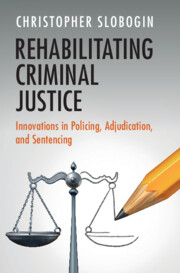Book contents
- Rehabilitating Criminal Justice
- Rehabilitating Criminal Justice
- Copyright page
- Contents
- Tables
- Preface
- Part I Policing
- Part II Adjudication
- Part III Post-conviction
- 9 Preventive Justice
- 10 Reconciling Desert and Risk at Sentencing
- 11 Specialized Criminal Courts
- 12 Abolitionism versus Minimalism
- Notes
- Index
11 - Specialized Criminal Courts
from Part III - Post-conviction
Published online by Cambridge University Press: 17 April 2025
- Rehabilitating Criminal Justice
- Rehabilitating Criminal Justice
- Copyright page
- Contents
- Tables
- Preface
- Part I Policing
- Part II Adjudication
- Part III Post-conviction
- 9 Preventive Justice
- 10 Reconciling Desert and Risk at Sentencing
- 11 Specialized Criminal Courts
- 12 Abolitionism versus Minimalism
- Notes
- Index
Summary
Chapter 11 takes an empirical look at federal court decision-making in criminal cases and concludes that both its consistency and quality are declining. An increase in the number of judges would help. But a complementary (and, given political realities, more feasible) way of improving trial and appellate court decision-making would be to convert our generalist courts to specialized tribunals, at both the federal and state levels. Focusing solely on the federal domain, this chapter proposes a judicial system comprised of separate criminal trial courts, circuit courts of appeal, and a National Court of Criminal Appeals. Such a system would significantly enhance trial court efficiency and appellate court capacity to produce quality decisions. Because there would be a superior appellate court devoted to ensuring uniform nationwide rules, such a system could also resolve doctrinal conflict on criminal justice issues more easily than the current system, which relies on a Supreme Court that is failing to address most of the disagreements among the circuits. Another positive feature of a specialized criminal court system is its synergies with the trial and sentencing proposals in this book. Whether or not the parties bargain, the inquisitorial preventive justice regime described in previous chapters relies heavily on judicial involvement at adjudication; a specialized system is more likely to produce the experienced trial judges needed in such a regime. At the same time, its shift of most dispositional decisions to parole boards would reduce the psychological demands on trial judges at sentencing and lessen the appellate workload by reducing sentencing appeals.
- Type
- Chapter
- Information
- Rehabilitating Criminal JusticeInnovations in Policing, Adjudication, and Sentencing, pp. 188 - 201Publisher: Cambridge University PressPrint publication year: 2025

